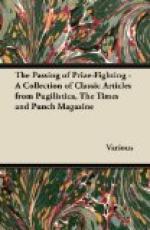Poor MILLET, it appears, got nothing.
* * * * *
WEIGHED IN THE BALANCE.
PART I.
Angelo Armstrong was a man of thirty. He had no capital, but by dint of honest and meritorious toil he found himself eventually earning a moderate salary as clerk in a London Insurance Office. He had been rejected for the Army on account of a defective knee-cap. Outside his work his tastes lay in the direction of botany and bibliomancy, which latter, according to the dictionary, is “Divination performed by selecting passages of Scripture at hazard.” He also indulged in good works and was President of the Society for the Preservation of the Spiritual Welfare of the Deputy Harbour Masters at our English Seaports. Thus he was worthy of the name of Angelo by which his mother had insisted that he should be christened, after seeing a picture of the famous historical incident of “Non Angli sed Angeli.”
Strangely enough he had never yet come under the influence of love. The three diversions given above had filled his spare hours, and woman was to him a sealed book. One morning he found a letter on his breakfast-table from an old family friend; it read as follows:—
“Ton Repos,” Woking,
December 11th, 1916.
“DEAR MR. ARMSTRONG,—Do tear yourself away from grimy London and come and spend the Christmas holidays with us. Only a small party and one of War-workers. We are all workers nowadays, aren’t we? You must come!
Sincerely yours,
AUGUSTA POGSON-DELABERE.
N.B.—Our house is a long way from the Crematorium!
This settled it; he decided to go.
PART II.
The Pogson-Delaberes’ party at “Ton Repos” consisted of four guests: Col. Maxton, from Aldershot, commanding the 106th Battalion of the Drumlie Highlanders; Miss Agatha Simson, a middle-aged munition-worker; our hero, and, oh! the lovely Miss Sylvia Taunton, another War-worker, aged 22. The result may be easily guessed. For two days the young people were left, naturally, very much together. They quickly fell into an easy intimacy, and on the third and last day of the holiday Angelo was profoundly in love. Gone were the botanizers, gone the bibliomants, gone the Deputy Harbour Masters. There was but one thought in his evacuated brain, to make the fair Sylvia his own.
His opportunity came after dinner that night when the rest of the party had gone out to look at some condemned pheasants which were to be shot at dawn. She was at the piano playing that deservedly popular song, “I’ve chipped my chip for England,” by Nathaniel Dayer, when he suddenly leant over her. “Miss Taunton—Sylvia,” he ejaculated, “you will be surprised at this suddenness, I know, but I cannot keep it in any longer; I love you enormously. Is there any chance for me?”




